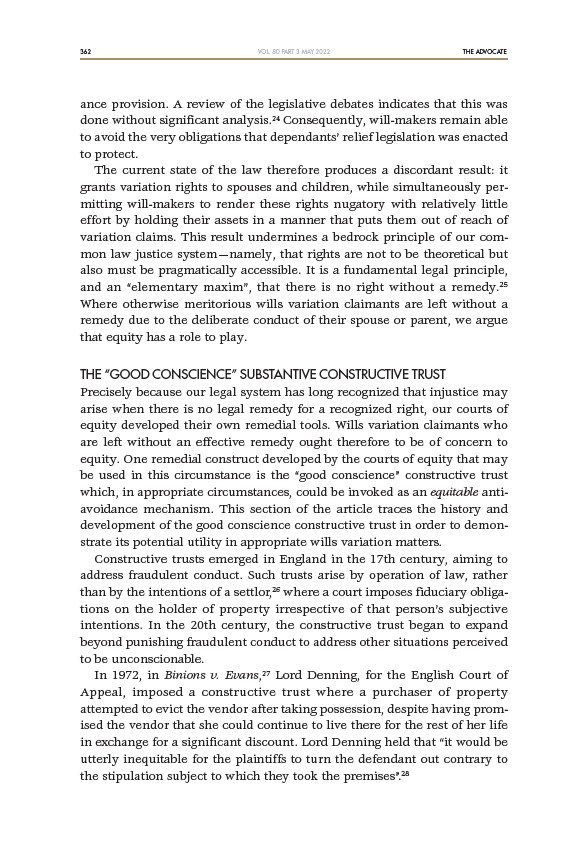
362 THE ADVOCATE
VOL. 80 PART 3 MAY 2022
ance provision. A review of the legislative debates indicates that this was
done without significant analysis.24 Consequently, will-makers remain able
to avoid the very obligations that dependants’ relief legislation was enacted
to protect.
The current state of the law therefore produces a discordant result: it
grants variation rights to spouses and children, while simultaneously permitting
will-makers to render these rights nugatory with relatively little
effort by holding their assets in a manner that puts them out of reach of
variation claims. This result undermines a bedrock principle of our common
law justice system—namely, that rights are not to be theoretical but
also must be pragmatically accessible. It is a fundamental legal principle,
and an “elementary maxim”, that there is no right without a remedy.25
Where otherwise meritorious wills variation claimants are left without a
remedy due to the deliberate conduct of their spouse or parent, we argue
that equity has a role to play.
THE “GOOD CONSCIENCE” SUBSTANTIVE CONSTRUCTIVE TRUST
Precisely because our legal system has long recognized that injustice may
arise when there is no legal remedy for a recognized right, our courts of
equity developed their own remedial tools. Wills variation claimants who
are left without an effective remedy ought therefore to be of concern to
equity. One remedial construct developed by the courts of equity that may
be used in this circumstance is the “good conscience” constructive trust
which, in appropriate circumstances, could be invoked as an equitable antiavoidance
mechanism. This section of the article traces the history and
development of the good conscience constructive trust in order to demonstrate
its potential utility in appropriate wills variation matters.
Constructive trusts emerged in England in the 17th century, aiming to
address fraudulent conduct. Such trusts arise by operation of law, rather
than by the intentions of a settlor,26 where a court imposes fiduciary obligations
on the holder of property irrespective of that person’s subjective
intentions. In the 20th century, the constructive trust began to expand
beyond punishing fraudulent conduct to address other situations perceived
to be unconscionable.
In 1972, in Binions v. Evans,27 Lord Denning, for the English Court of
Appeal, imposed a constructive trust where a purchaser of property
attempted to evict the vendor after taking possession, despite having promised
the vendor that she could continue to live there for the rest of her life
in exchange for a significant discount. Lord Denning held that “it would be
utterly inequitable for the plaintiffs to turn the defendant out contrary to
the stipulation subject to which they took the premises”.28